
Mobility-impaired Angler Trying To Save Access To Popular Lake Roosevelt Beach
A disabled Lake Roosevelt angler and local officials are concerned that access to a good fishing hole just above Grand Coulee Dam might be reduced, or even lost entirely.
That’s because the Bureau of Reclamation is mulling the future management of Geezer Beach, a top spot to plunk for chunky rainbow trout during the winter and early spring.
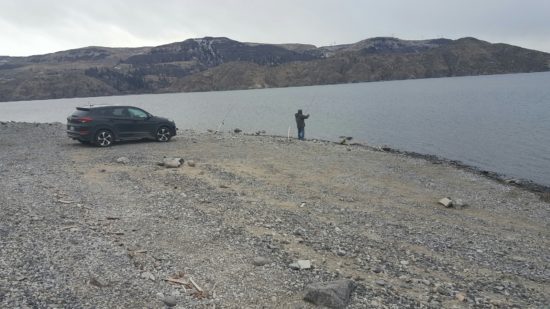
Hank Wiebe, a Northwest Sportsman reader who fishes there more days than not from January through June, is leading the charge to keep the area open to all.
He’s been working hard to get the word out, circulating a petition at area businesses, writing letters to the local paper and his federal lawmakers, and more.
“Due to my disabilities, this beach provides one of the few places I can access … fish,” Wiebe explained in comments sent to BOR last month during a “pre-scoping period” identifying issues to address ahead of an environmental assessment that is expected later this winter. “There is a strong group of fishermen, with varying degrees of limited mobility, who often fish alongside me.”
The Town of Grand Coulee resident describes himself as a heart attack survivor who has suffered an aortic aneurysm, and has COPD and other medical issues that combine to make walking very far “tough.”
“Not to mention a fall on the rocks would exacerbate all of the above issues, so being able to drive to this location is about my only choice for fishing from shore,” Wiebe says.
Over the years he and his family have sent us numerous pictures of themselves, including Wiebe’s granddaughter Remington, enjoying success at Geezer Beach during Lake Roosevelt’s annual winter drawdown, when anglers drive down the lakebed from a parking area and cast their lines out.
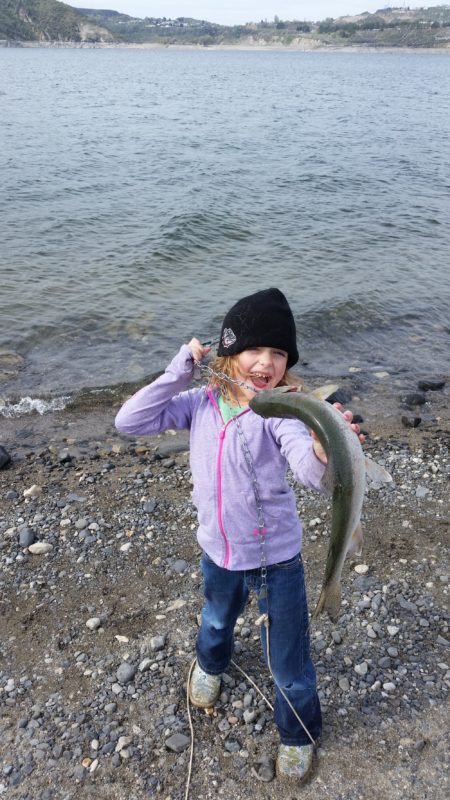
Indeed, it’s an opportunity that draws anglers from “as far away as Seattle,” Robert Poch, Coulee Dam’s mayor pro tem, wrote in his city’s official comments to BOR.
And those people “stay in our local motels, eat at our restaurants and patron our stores. The Town of Coulee Dam already struggles to maintain with the limited revenue sources it receives today.”
While the municipality fancies itself as the “green oasis at the foot of Grand Coulee Dam,” Poch worries that fewer visitors will lead to reduced sales and hotel tax revenues.
His letter stated that the city council “expressed very strong feelings against” BOR’s proposed changes.
The Star, a weekly newspaper, covered the story in a series of front-page pieces last month, and it reported that the federal agency is responding to the Colville Tribes’ issues with vehicles driving on the beach.
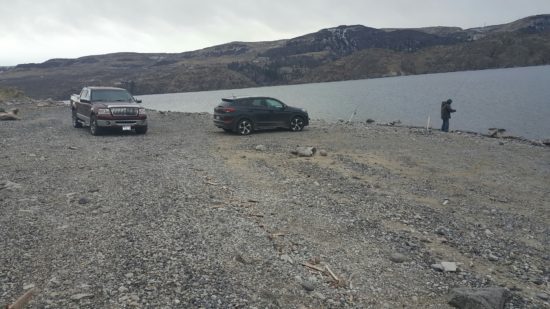
“This is a concern for both protection of cultural resources, and protection of water quality,” a tribal official stated in an email quoted for a Dec. 26 Star story, adding that driving on the lakebed is otherwise prohibited on Roosevelt but not enforced at Geezer Beach, which sets a bad example and creates an enforcement headache.
In its press release announcing a call for public comment, BOR said that entering the drawdown area in a vehicle represents a public safety risk “because these vehicles can become stuck, roll into the reservoir, or become abandoned.”
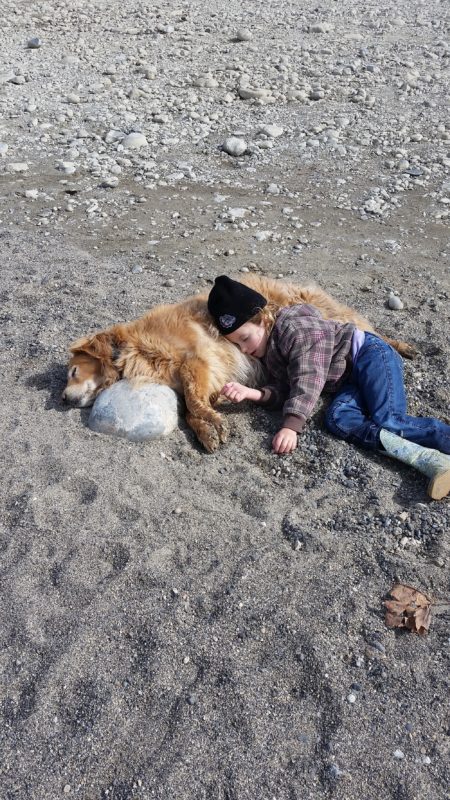
That’s not something Coulee Dam officials have seen, however.
“For more than 40 years, we cannot recall ever hearing of an incident where a vehicle has been stuck, driven or rolled into the reservoir or been an accident at Geezer Beach. The access roads, which have been in existence since the 1960’s, are well established and have been packed down, providing a firm surface for vehicles to travel on,” Mayor Poch wrote.
Photographs Wiebe took of different parts of the beach on Jan. 8 showed it to be remarkably clean of the type of trash one usually finds, unfortunately, at fishing accesses.
“All my fishing buddies and I strive to keep this area litter free,” he notes.
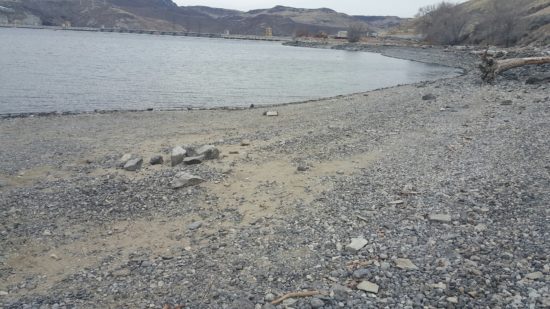
This is not to say that locations significant to the Colville Tribes haven’t been impacted by settlement, development, dam building and other activities or shouldn’t be protected, but in that Dec. 26 story, Greg Behrens told The Star that during a three-decade-long career working at Grand Coulee he did geological and geographic studies of the area, and that Geezer Beach was “reworked and completely modified through the construction of the Dam’s history” while being used for staging.
“If the concern for the allowed vehicle access is based on ‘cultural resource preservation’ then the prior construction activities have made this a non-issue. This includes the nearshore environment well below the accessible areas today,” Behrens told reporter Jacob Wagner.
There have been state-tribal tensions this decade over fishing at Geezer Beach and management of Lake Roosevelt.
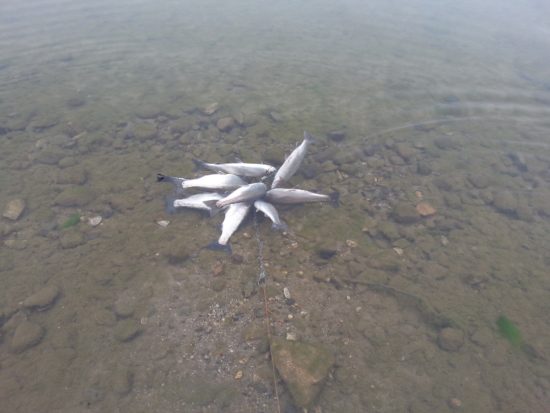
Closing off access to Geezer entirely was one of three alternatives that BOR was gathering public comment on last month for the upcoming environmental assessment, or EA.
Another focuses on restricting parking to designated areas just off an access road from Coulee Dam and that sit at roughly the 1300-foot elevation mark. That would still allow angling but make it much more difficult for mobility-impaired anglers like Wiebe to reach the water when Roosevelt dips to as low as 1,220 feet in midspring.
The third is for maintaining the status quo.
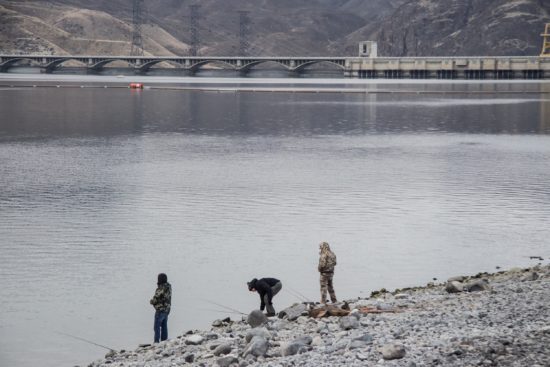
“With the information gathered from the input we received, Reclamation will now write a draft EA and it will be available for public comment,” says Lynne Brougher, a BOR spokeswoman at the agency’s Grand Coulee office. “At this time, we anticipate that the draft EA will be available for comment in February and a final decision will be made this spring.”
Lake Roosevelt is so huge that it is part of two different Washington Department of Fish and Wildlife regions, and the managers of both — Steve Pozzanghera and Jim Brown in Spokane and Ephrata, respectively — say they will be watching for the EA to come out so the agency can submit comments.
“We would hope they wouldn’t do an outright closure,” says Brown of BOR’s alternatives. “Their problem statement makes that seem a bit extreme, on its face. If it is about vehicles, that is seemingly an excessive step, when nothing in the scoping description goes beyond the stated problem being with vehicles.”
“We should be advocating for continued public access — the issue will be foot traffic versus vehicle entry,” adds Pozzanghera.
For Hank Wiebe, the latter is preferred.
“There’s many of us fishermen who have medical issues and need areas like this to enjoy/teach grandkids all about fishing,” he says.
